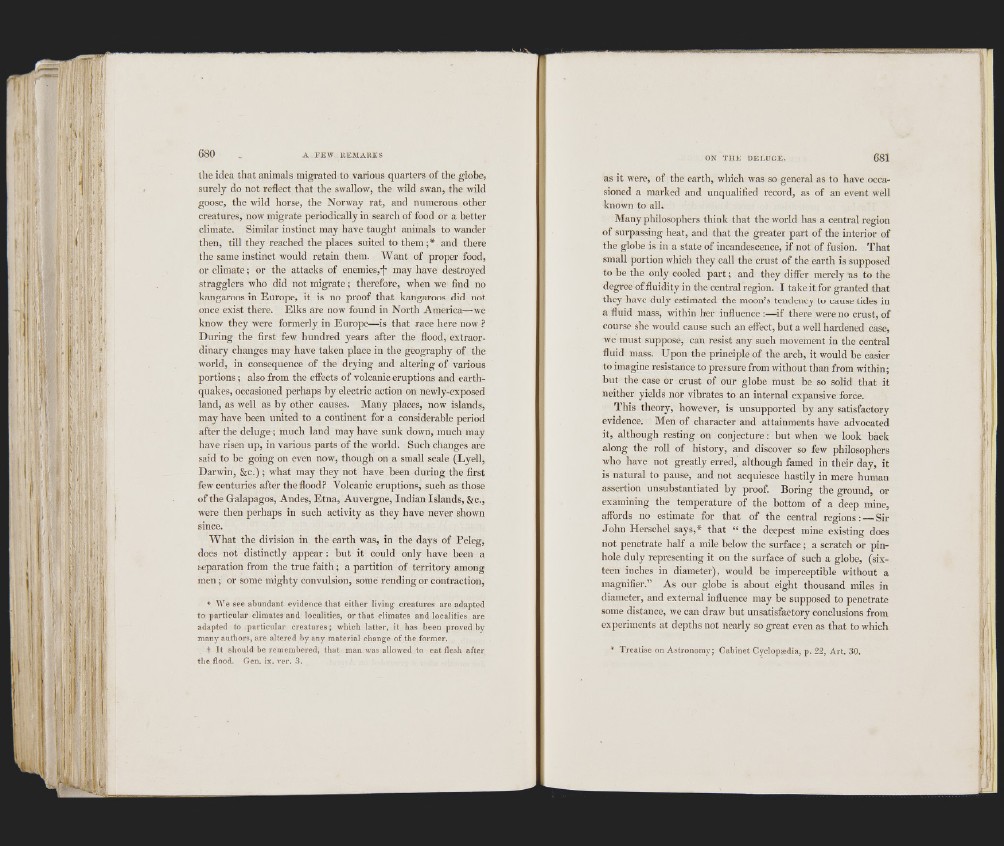
1.1.
I
I ii
ir*
the idea that animals migrated to various quarters of the glohe,
surely do not reflect that the swallow, the wild swan, the wild
goose, the rvild horse, the Norway rat, and numerous other
creatures, now migrate periodically in search of food or a better
climate. Similar instinct may have taught animals to wander
then, till they reached the places suited to them ;* and there
the same instinct would retain them. Want of proper food,
or climate; or the attacks of enemies,# may have destroyed
stragglers who did not migrate; therefore, when we find no
kangaroos in Europe, it is no proof that kangaroos did not
once exist there. Elks are now found in North America—we
know they were formerly in Europe—is that race here now ?
During the first few hundred years after the flood, extraordinary
changes may have taken place in the geography of the
world, in consequence of the drying and altering of various
portions; also from the effects of volcanic eruptions and earthquakes,
occasioned perhaps by electric action on newiy-exposed
land, as well as by other causes. Many places, now islands,
may have been united to a continent for a considerable period
after the deluge; much land may have sunk down, much may
have risen up, in various parts of the world. Such changes are
said to be going on even now, though on a small scale (Lyell,
Darwin, &c.) ; what may they not have heen during the first
few centuries after the flood.? Volcanic eruptions, such as those
of the Galapagos, Andes, Etna, Auvergne, Indian Islands, &c.,
were then perhaps in such activity as they have never shown
since.
What the division in the earth was, in the days of Peleg,
does not distinctly appear : hut it could only have heen a
separation from the true faith; a partition of territory among
men; or some mighty convulsion, some rending or contraction,
* \Ye see abundant evidence tbat either living creatures are adapted
to particular climates and localities, or tbat climates and localities are
adapted to particular creatures; wliicb latter, it bas been proved by
many authors, are altered by any material change of the former.
t It should be remembered, that man wa.s allowed to eat flesh after
tbe flood. Gen. ix. ver. 3.
ON THE DELUGE. 681
as it were, of the earth, which was so general as to have occasioned
a marked and unqualified record, as of an event well
known to all.
Many philosophers think that the world has a central region
of surpassing heat, and that the greater part of the interior of
the glohe is in a state of incandescence, if not of fusion. That
small portion which they call the crust of the earth is supposed
to be the only cooled part ; and they differ merely as to the
degree of fluidity in the central region. I take it for granted that
they have duly estimated the moon’s tendency to cause tides in
a fluid mass, within her influence:—if there were no crust, of
course she would cause such an effect, but a well hardened case,
we must suppose, can resist any such movement in the central
fluid mass. Upon the principle of the arch, it would be easier
to imagine resistance to pressure from without than from within;
but the case or crust of our globe must be so solid that it
neither yields nor vibrates to an internal expansive force.
This theory, however, is unsupported by any satisfactory
evidence. Men of character and attainments have advocated
it, although resting on conjecture : but when we look back
along the roll of history, and discover so few philosophers
who have not greatly erred, although famed in their day, it
is natural to pause, and not acquiesce hastily in mere human
assertion unsubstantiated hy proof. Boring the ground, or
examining the temperature of the bottom of a deep mine,
affords no estimate for that of the central regions: — Sir
John Herschel says,* that “ the deepest mine existing does
not penetrate half a mile below the surface ; a scratch or pinhole
duly representing it on the surface of such a globe, (sixteen
inches in diameter), would he imperceptible without a
magnifier.” As our globe is about eight thousand miles in
diameter, and external influence may he supposed to penetrate
some distance, we can draw but unsatisfactory conclusions from
experiments at depths not nearly so great even as that to which
« Treatise on Astronomy; Cabinet Cyclopscclia, p. 22, Art. 30.